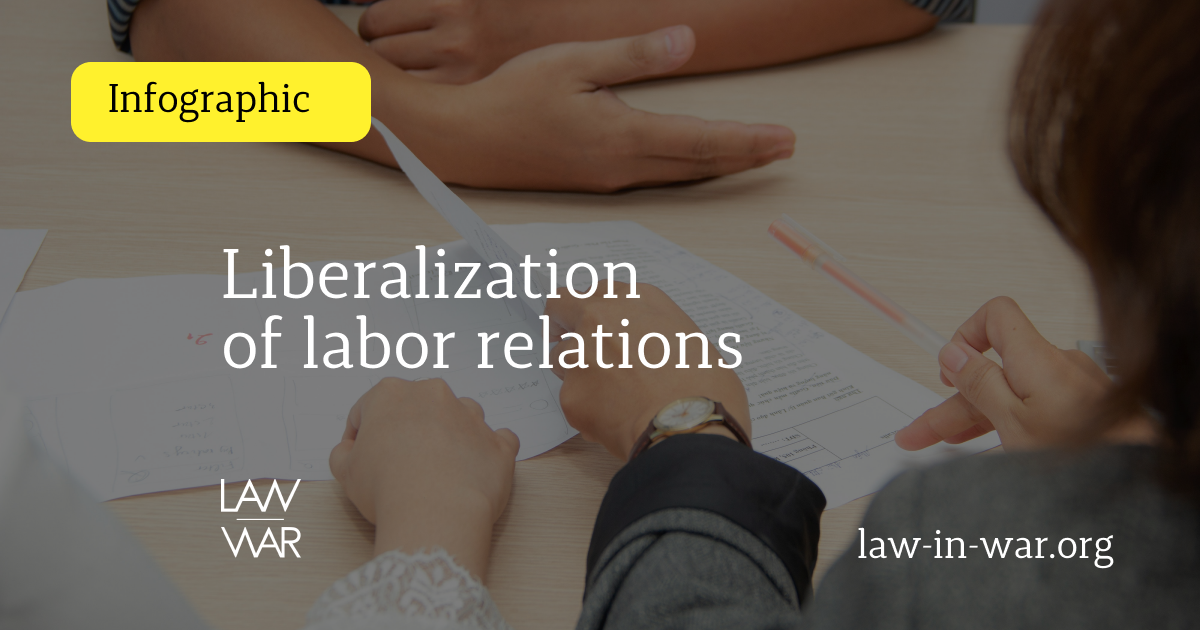The Labor Relations in Martial Law Act shall remain in force throughout the martial law in Ukraine and shall determine the labor relations procedures under the martial law.
What does this Law stipulate?
This Law envisages restrictions on constitutional rights and freedoms that are stipulated by the Constitution of Ukraine: Article 43 – the right to work and Article 44 – the right to strike for the protection of economic and social interests.
The Law introduced changes to the procedure of transfer of an employee to another job:
- an employee may, without his or her consent, be transferred to a work not stipulated in the employment contract, unless such work is unsuitable due to his or her health condition, with the only purpose to prevent or eliminate the consequences of hostilities and other circumstances that threaten or may threaten life or normal living conditions of people;
- the amount of salary payable to an employee that has been transferred to another job shall be no less than an average salary at the place of his or her previous work;
- a two-month notice period to inform an employee about significant changes in work conditions shall not apply;
- we would like to remind you that the essential work conditions represent salary, benefits, working hours, presence or absence of part-time work arrangements, combining jobs, changing ranks and titles of job positions and other conditions related to labor rights and responsibilities.
Employee dismissal procedures:
- An employee shall have the right to terminate an employment contract within the time period he or she specified in his or her written employment termination application, if the place of work is in the combat zone, provided that such employee is not involved in work on critical infrastructure or community service;
- It shall be acceptable to dismiss an employee during the period of his or her temporary incapacity for work (sick leave), as well as during the period of leave (except for leave in connection with pregnancy, childbirth and child care leave until the child reaches the age of three).
It shall be allowed to increase the working hours:
- up to 60 hours per week (for the general category of employees) and up to 50 hours (for employees whose working schedule is of reduced duration); a decision to increase the duration of a working week is at the discretion of an employer; yet it shall not be interpreted as an employer’s obligation.
- An employer may establish a five- or six-day working week at the discretion of the military command together with the military administrations.
Remuneration for work:
- wages shall be paid on terms specified in the employment contract.
- Should it be impossible to pay the salary due to military actions, it shall be allowed to postpone the salary payment until the moment when the enterprise is able to carry out its main activity.
Please note that the employer shall not be held responsible for a failure to pay wages within the period specified by law, however, the employer shall take all possible measures to ensure employees are paid salaries in the timely fashion. Furthermore, the employer shall not be released from the obligation to pay wages if the employment relationship with an employee continues.
On vacations:
- duration of paid leave – 24 calendar days;
- the employer may deny the employee leave if the employee is involved in critical infrastructure;
- the period of unpaid leave is unlimited.
On suspending the employment contract:
- should it be impossible for the employer to provide the employee with work, or should the employee appear unable to perform labor duties, the parties to the employment contract shall have the right to suspend its validity. They shall communicate this to each other as deems appropriate;
- the employee shall retain the job for the entire duration of the time for which the employment contract is suspended;
- The aggressor state shall reimburse wages and other benefits accrued to the employee.

